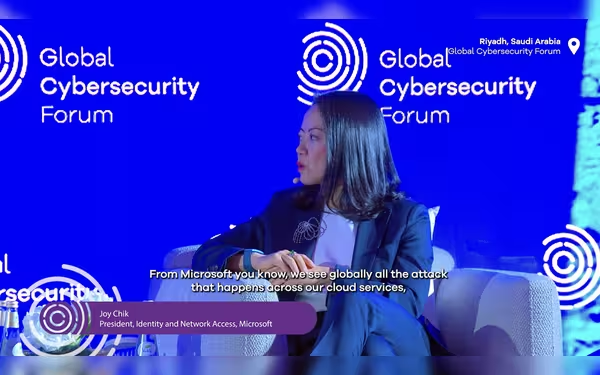Sunday, October 6, 2024 12:27 AM
Microsoft Executive Advocates for Democratizing Cybersecurity Expertise
- AI can bridge the cybersecurity workforce gap.
- Password-based attacks surged to over 30 billion monthly.
- Microsoft promotes a password-free future with passkey technology.
 Image Credits: arabnewspk
Image Credits: arabnewspkMicrosoft's Joy Chik emphasizes democratizing cybersecurity expertise to combat AI-driven digital crimes.
In today's digital age, the rise of artificial intelligence (AI) has brought about significant advancements, but it has also opened the door to new challenges, particularly in the realm of cybersecurity. As technology evolves, so do the tactics employed by cybercriminals, making it crucial for organizations to stay ahead of the curve. Joy Chik, the president of Identity and Access Network at Microsoft, recently highlighted the importance of democratizing cybersecurity expertise to effectively combat the increasing threat of AI-fueled digital crimes.
During a recent discussion at the Global Cybersecurity Forum in Riyadh, Chik pointed out a staggering increase in password-based attacks on cloud identities, which skyrocketed from 3 billion to over 30 billion per month in the first quarter of 2023. This alarming statistic underscores the urgent need for enhanced security measures. Microsoft has also reported detecting around 6,000 attempted cyberattacks daily over the past year, which include various forms of phishing scams and sophisticated attacks backed by nation-states targeting critical infrastructure.
Chik emphasized that one effective way to tackle these challenges is by democratizing cybersecurity expertise. She explained that AI can serve as a bridge to fill the workforce gap in this field. By leveraging AI tools, more individuals can be empowered to combat cybercrime, thus expanding the pool of skilled labor in cybersecurity. "So, I think to address that, one way is to democratize the expertise in security, and that’s when Gen AI, what Microsoft would produce — the kind of copilot for security," Chik stated.
Moreover, Chik stressed the importance of not only being defensive but also taking an offensive approach to cybersecurity. This involves designing systems that are secure by default and implementing strategies to defend against supply chain attacks. She elaborated on the various threats that organizations face, ranging from simple credential attacks to more complex, nation-state-sponsored attacks targeting critical infrastructure.
Microsoft's commitment to enhancing security measures is evident in its Secure Future initiative, which aims to promote a security-first mindset and culture. Chik noted that addressing immediate needs is essential, but fostering a long-term security culture is equally important. One of the key aspects of this initiative is moving towards a password-free future. Chik remarked, "We all know passwords are not secure, and yet they’re the most common way for people to log into their online services. How can we provide a simple yet more secure method for identifying individuals without requiring them to remember passwords?"
To tackle this issue, Microsoft, along with industry leaders like Google and Apple, is developing passkey technology. This multi-factor authentication method is designed to be phishing-resistant and does not require a password at all. Instead, it utilizes mobile phones to securely store credentials, making it much harder for cybercriminals to exploit.
As digital crimes continue to evolve, it is imperative for organizations and individuals alike to adapt and enhance their cybersecurity measures. By democratizing expertise and embracing innovative technologies like AI and passkey authentication, we can create a safer digital environment for everyone. The future of cybersecurity lies not just in defense but in proactive strategies that empower a broader range of individuals to participate in the fight against cybercrime.












